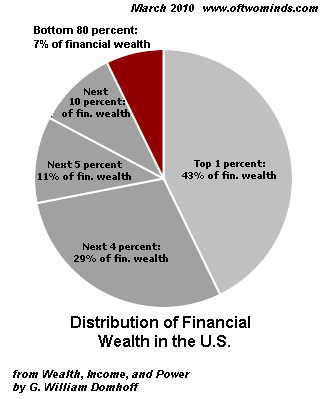All those angered by the mere question of the viability of this predatory pillaging in the name of capitalism are incapable of even admitting this cultural crisis exists.
Somewhere along the line, we lost the ability to distinguish between earning a profit and maximizing private gain by any means, i.e. Infinite Greed. If you insist on making this distinction now, you anger a lot of people, as it blows the capitalist cover of Infinite Greed.
The distinction between earning a profit and maximizing private gain by any means angers not just the few benefiting from the useful delusion that Infinite Greed is simply profit on overdrive; it seems to anger everyone who believes the Status Quo of burning mountains of coal to power towel warmers, sitting in traffic burning petrol two hours a day and central banks enriching the already wealthy is not just sustainable but gol-darned good.
If you make the distinction between earning a profit and maximizing private gain by any means, then you realize the status quo is neither sustainable nor good: it is unsustainable and evil.
This angers everyone who has rationalized their investment in (and defense of) an evil system, because, well, it’s hard to feel all warm and fuzzy about your choices if the phony facade falls and the evil of the system you’ve defended is starkly revealed.
Every enterprise must earn a profit to survive. A worker-owned collective must earn a profit, as it needs money to reinvest in the business and reward those who have invested their capital (human, social, financial, intellectual, etc.) in the enterprise.
If the collective can’t reinvest in new plant and new workers as the old equipment fails and old workers retire, it will weaken and collapse. This is equally true of any business owned by the state (i.e. a socialist enterprise): if the state-owned enterprise doesn’t earn a profit that can be reinvested in the business, it can only survive if it is subsidized by some other enterprise that is earning a profit.
But the system we inhabit now is not based on earning a profit; that’s merely the public-relations propaganda used to cloak its real heart: Infinite Greed. Maximizing private gain by any means isn’t about earning a profit; it’s about strip-mining the planet and the labor and profit of others.
If I buy a political favor that essentially eliminates competition in my private fiefdom, that doesn’t generate more goods and services; it’s simply maximizing my private gain at the expense of everyone else in the system.
Goosing the stock market ever higher only solves one problem: the terrible prospect that the assets of the incredibly wealthy might reset lower. It doesn’t make the system sustainable or less evil; indeed, it is the manifestation of the evil at the heart of the entire system. It’s not about shiny capitalism for the masses, or earning a profit by producing more and better goods and services: it’s about doing whatever it takes to maximize private gain.
The success of this vast defense of those maximizing their private gain at the expense of everyone else appears invulnerable to many. In a system where central banks can print infinite money to further expand the value of the Financial Aristocracy’s assets, it certainly seems that there is no force in the Universe that could possibly reduce this mighty Empire that worships only one god, that of maximizing private gain by any means.
Let’s say this system is sustainable: the system that enriches the few at the expense of the many, the system that strip-mines the planet to enable private jets and trillions of dollars of wealth to rest comfortably in tax havens, a system that pays Nobel-prize-winning shills to spew nonsensical defense of the patently indefensible: if this is sustainable, we must ask: at what cost?
Is feeding this machine cost-free? Are there no consequences? Can the Federal Reserve not just create money to further enrich the few, but elminate all cost and consequence as well?
To everyone resigned to the permanence and invulnerability of this evil, and everyone angered by the idea that it might implode and deprive them of their share of the swag, I suggest we consider a funny thing called Karma, which is the simple idea that actions have consequences which cannot be shoved onto others forever.
A similar idea is reversal is the way of the Tao. What appears mighty and invulnerable melts into air, as extremes naturally cycle to the opposite state.
Our loss of the ability to distinguish between earning a profit and maximizing private gain by any means has triggered a cultural crisis, one that few are willing to recognize, much less discuss. All those angered by the mere question of the viability of this predatory pillaging in the name of capitalism are incapable of even admitting this cultural crisis exists. Their response to the question is to accuse anyone who dares question the morality and sustainability of the current system of desiring a financial Apocalypse.
The easily angered are again confusing two distinct concepts: wanting an Apocalypse is entirely different from seeing an Apocalypse on the horizon. A financial Apocalypse wouldn’t even touch the assets of the many, because their financial wealth is near-zero. If the $20 trillion (or whatever the number is, nobody really knows) sitting in tax havens melted into air, who would even notice except the pillagers and those paid to defend them?
The cultural crisis angers people because it threatens to loosen their grasp on the few threads of security they believe are real. Those thin threads are illusory, and a crisis will eventually be resolved in one fashion or another–not necessarily in an Apocalypse, but in a fast-spreading recognition of the wrongness and unfairly distributed costs of supporting a system that is intrinsically evil and unsustainable.
